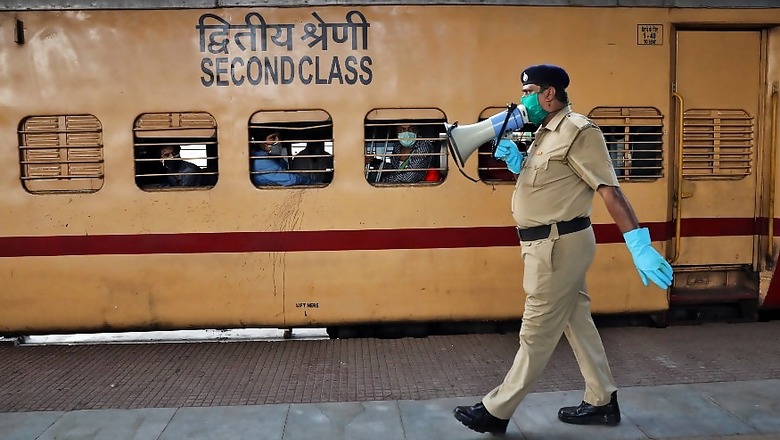
views
At least seven deaths on-board migrant special trains were reported on Wednesday, officials said, putting the Railways in the dock over its handling of these non-AC trains.
The national transporter said most of the deceased had pre-existing health conditions.
The seven deaths -- four on-board trains travelling to Bihar and three terminating in Uttar Pradesh -- happened over the past few days, and were reported on Wednesday.
The death of 35-year-old Uresh Khatoon shook the conscience of the nation and left the Railways scrambling for an explanation. Her toddler's vain attempt to wake up her from the eternal sleep on a platform in Bihar's Muzaffarpur was captured in a moving video that went viral on social media Wednesday, opening the floodgates of criticism for the Railways.
The Railways attributed her death to a recent heart surgery, also corroborated by her son.
Another death reported from Muzaffarpur was that of four-and-a-half-year-old son of a migrant from Bihar based in Delhi. The boy died at the railway station here on arrival by a 'Shramik Special' train, while his father desperately hunted for some milk he believed would have saved his child.
While his father said he died of heat, Deputy Superintendent of Police, Railway, Ramakant Upadhyay, claimed the boy was ailing for some time and had died before the train reached Muzaffarpur station.
In the state's Danapur, the body of 70-year-old Basisth Mahato, a heart patient, was taken out of the Mumbai-Darbhanga Shramik Special train. Mahto was returning with his family after treatment in Mumbai and died between Maihar and Satna, the Railways said.
Also, a 58-year-old migrant worker died on-board the Surat-Hajipur Shramik special train on Tuesday evening, Superintendent of Police, Devendra Nath, said.
He has been identified as Bhushan Singh of Saran district in Bihar. The body has been
In Uttar Pradesh, a migrant train from Mumbai reached Manduadih, Varanasi, on Wednesday with two dead passengers -- physically challenged Dashrath Prajapati (30), and 63-year-old Ram Ratan Gaud.
The Railways said while Prajapati was suffering from a kidney disease, Gaud had "many ailments".
The body of Sheikh Salim, 45, a resident of Bahraich (UP) was found aboard the Vapi-Deen Dayal Upadhayay Junction Shramik Special train when it reached Sagar station.
The Railways said the body has been kept at the district hospital for postmortem and for testing of coronavirus.
Travelling migrant workers have complained of lack of food and water on-board these special trains and also alleged they are not running on time and are being diverted "at will".
The Railways has, however, maintained that these trains are running on "pre-scheduled rationalised routes".
Some trains which should have taken 24 hours to reach to their destinations, arrived in over two days, according to reports, leaving the passengers on-board hungry and desperate.
"A Few deaths have been reported in Shramik special trains. In most of these cases, it is discovered that those who died are old sick people and chronic disease patients, who had actually gone to big cities for medical treatment and could come back only after the Railways started these Shramik Special trains," said a spokesperson for the Railways.
He also said that 78,11,575 meals and 11,07,7,830 water bottles were given to migrant workers on board these trains till May 26.
However, many passengers have tweeted that they were starving on-board due to longer than anticipated run time of these trains.
The Railways also said that the originating state has to provide food and water to the migrant workers before the start of the journey, but in many places they are being handed out just 200 ml water pouches.
To deal with the issue, the Railways through an order on May 22, empowered the General Managers of each zone to spend up to Rs 1 lakh on each Shramik Special train to arrange meals for the workers.
The Railways has also instructed zones to ensure that in no case meals to the trains should be skipped.
If, it has to be skipped due to operational exigencies, officials have been asked to first ensure alternative arrangements. "Find innovative solutions to problems".
A senior official told PTI that due to the social-distancing norms, food and water is placed at the gate of the coaches, they are not distributed by anyone on-board and the workers are expected to share it among themselves.
In case of any complaints, the meals are provided again at the next station where it is available.
Officials said this arrangement could have failed as migrant workers have been hungry or with no food for days.




















Comments
0 comment